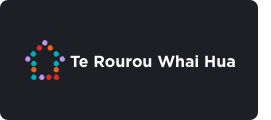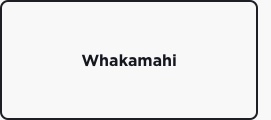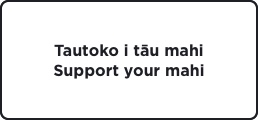5. Strengthen your understanding (Whakamahi)

|
As a Learning Support Coordinator it may be your role in whakamahi to support kaiako, support staff and others to implement the various strategies and ideas within the plan. You will be keeping a careful focus on working towards the agreed outcomes. Your role in whakamahi may be:
The ideas and resources in this section are designed to help you think about what role you have in supporting a plan, whether it is for an individual learner, a small group of ākonga or kaiako, or across a school or cluster. |
||
Connections with whānauThe part whānau play in supporting the implementation of any plan is essential. Having strong links between home and school will create coherence and cohesion for ākonga, their whānau and kaiako. Opportunities to share ideas, provide feedback, problem solve challenges and celebrate progress as it happens is all important for gaining and maintaining momentum with the plan. As an LSC you may consider:
The Inclusive Education website has suggestions for approaches to support home-school contact and supporting learning at home. |
||
|
These videos are examples of partnering with whānau by valuing their contributions in the everyday routines and activities of ākonga and having productive ways to share information and make connections. What's important to Linda is finding different ways where parents are valued and can contribute and participate in her learning programmes. E-portfolios are a tool to support connections and engagement with whānau. They enable ākonga to share their learning and for whānau to have meaningful and authentic conversations about learning and progress. John is in a high school and he reflects on the value of using the SMS to share information about students between staff and e-portfolios to share information with parents. |
||
Professional Learning Communities |
||
|
Within any plan kaiako, leaders, whānau may be learning new ways of being, new strategies, new innovations. Whether the plan is for a cluster, school or more targeted or individualised, teams may need opportunities to learn together and develop and strengthen the knowledge, skills and practices embedded in the plan. |
||
| A professional learning community (PLC) is a form of teacher professional development that involves teachers working together in a collaborative, interactive and ongoing way in order to improve teacher practice and outcomes for students. - The Education Hub | ||
|
The Education Hub has a useful introduction to professional learning communities. In this article they identify common themes across the literature around the use of professional learning communities.
There is more useful information about practices of effective professional learning communities and dimensions of a professional learning community that will help you think about the enabling conditions that are needed when establishing and maintaining effective learning teams. |
||
|
This video talks about the power of online learning communities to build knowledge. Learn more about other virtual learning networks and professional learning communities. |
||
CoachingAs an LSC you may have a role in supporting kaiako and others as they develop and strengthen practices that enable progress towards goals identified through tātai. Changing current practices and embedding new ones can be challenging and complex and require the support of others. Coaching provides timely and relevant feedback. It is focused on kaiako needs, improving discrete skills and done within a specific context. |
||
| So often in the past our learning relationships have been very one-sided in terms of the work, and I think the power of coaching and mentoring is being able to seek that space of new knowledge, new learning that we get when we’re open to what our learning partner brings in the situation as well. - Jan Robertson | ||
|
Download Jan's 3R's for coaching learning relationships article |
||
|
This video talks about the importance of developing a culture of coaching where everyone is a leader of learning. |
||
|
Knowing the principles of adult learning may be useful to understand when engaging with kaiako and others in a coaching relationship. These 6 principles are based on the work of Malcolm Knowles:
|
||
|
The Teacher professional learning and development best evidence synthesis provides useful insights into considerations for LSC as you support teachers to strengthen the professional skills they need to teach challenging curricula to diverse ākonga. |
||
|
Click on the images to link to PDFs |
Click on the images to link to PDFs |
|
|
|
||
|
Sarah Whiting, a facilitator for CORE Education, discusses the role of coaching and mentoring in teaching. She talks about how important it is that coaching and mentoring happens alongside people, providing support in a safe, confidential and non-judgemental space. |
Click on the image to go to the video |
|
Grow ModelOne framework that can support a coaching relationship is GROW. In this model the coach can support an individual or team to work towards a goal. In the context of an LSC this could be supporting a teacher or group of teachers to implement a new teaching and learning strategy that had been identified in tātai. In this model the coach is not viewed as having the answers but instead uses powerful questions to empower others to generate solutions. Essential also to this process is the data that kaiako can bring to the conversation. This may be data that LSC have helped to collect through observations, student achievement data, class work, ākonga/whānau learning conversations, other schoolwide collected data eg attendance etc. GROW:
Click in the image to go to the video |
||
Teacher AidesIn whakamahi teacher aides may have a role in the plan. The Education Endowment Foundation has a useful summary of their research on the effective use of TAs. LSC and kaiako may find this guidance useful, as they have the day-to-day responsibility for deciding how to make the most effective use of the TAs with whom they work. Click on the image to see in full |
||
|
As an LSC it may be your role to support the work of TAs alongside kaiako in whakamahi. TAs can work inclusively within various learning settings. The Inclusive Education website has a guide about teacher aide practice with information on: This video talks about the partnership approach between a teacher and support teacher in a secondary context. This video talks about the partnership approach between a teacher and teaching assistant in a primary context. |
||
|
To access more resources and tools to 'support your mahi' in whakamahi click on the tab below. |
||



